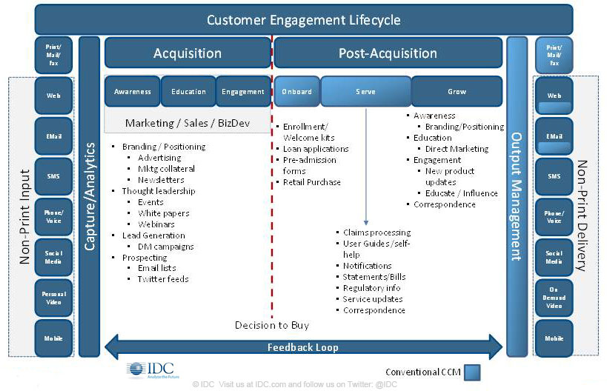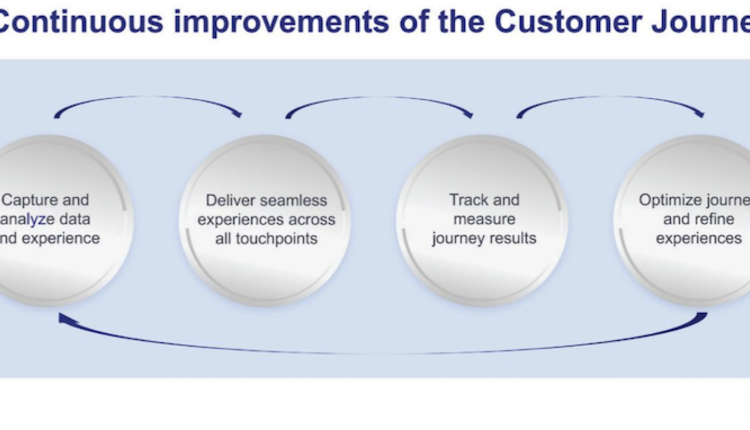
The term customer communication management (CCM) has always been something of a misnomer in my mind—a cumbersome, 11-syllable phrase to describe composing and distributing bills, statements, policies and regulatory documents to customers. To be sure, enterprise CCM solutions have been used in other ways, but mostly, the phrase brings to mind these critical but decidedly one-way functions.
When I joined IDC earlier this year, one of the first things we discussed was the need to break out of that one-way mindset and embrace the reality of two-way communication, or conversation, because that’s where we believe real value will be created in the future.
Businesses today face a confusing array of conversation channels, and customers are looking for integrity—business integrity, which is a match between claims made by the brand and what is actually delivered, as well as conversational integrity, which is an intelligent, ongoing response to the customer’s own situation. Customers are wresting control of the business-to-consumer (B2C) conversation away from the corporation and setting new rules by which the corporation must abide or deal with the consequences.
It’s not so much a matter of empowerment but more a matter of reduced friction brought about by new technologies and new attitudes. A search for “social media and bad customer service” turns up dozens of results, such as the Vine video of an unhappy Apple customer that was shared 24,000 times on Facebook and has received more than eight million views or YouTube videos, some with more than two million views, documenting case after case of bad customer service. It’s not pretty out there. Cameras are everywhere, and the barriers to posting one’s unhappiness online have never been lower.
Managing conversation to mitigate or, better yet, avoid this kind of scenario is an enormous challenge. For those of us looking to create future value in the customer communication management space, this means an expansion of vision, a blending of things that have heretofore been separate, a revised view of how we fit into the conversation and, perhaps, even an expansion in the scope of what we do.

At IDC, we are using the customer engagement life cycle as our model and calling this new, broader landscape, "Smart Customer Engagement." We are looking beyond the conventional world of critical and regulatory communications to understand how both technology vendors and service providers can enhance the connection between the customer and the business, improve the conversation for both parties and help businesses achieve the conversational integrity we feel will be vital to future success.
We see exciting changes in three broad areas:
- Integration: Today’s enterprise is full of data silos. Recent IDC research indicates a typical worker has to access six different systems to perform regular duties. Some of these silos will be with us for years due to privacy and regulatory concerns, but serving as connectors to make it easier to identify and integrate disparate data sources and allow for smarter conversations is an area of opportunity for CCM.
- Facilitation: Perhaps the biggest change is the shift in vision from performing isolated functions, such as composition and output management, to analytics-based business processes. Conversational analytics are just in their infancy, and we are seeing increased interest in, and a blending of, adaptive case management, campaign management and other process-intensive approaches into the conversation space.
- Transformation: Transforming a compartmentalized enterprise into a synchronous conversationalist is far from easy. Everything from culture to technology is involved, and there are multiple barriers to be overcome. However, it is a role where CCM vendors and service providers are uniquely positioned to create value—if they understand their strengths and can apply them to this new world.
Mistakes are simply not tolerated in the world of regulatory and revenue-related documents. This discipline and focus, which CCM providers have been honing for years, is something that will be mandatory for smart customer engagement to succeed.
Smart Customer Engagement: Integrate. Facilitate. Transform. At IDC, we believe this is the evolutionary path of CCM. The road ahead won’t be easy and will require that we change both our positioning and our conversations with our own customers, but if it was easy, anyone could do it—and where’s the fun in that?
Terry Frazier is a research director within IDC's Document Solutions research group. He is responsible for the Smart Customer Engagement practice as well as written research in managed print and document services and document outsourcing. Follow @IDCHardcopy on Twitter.
















